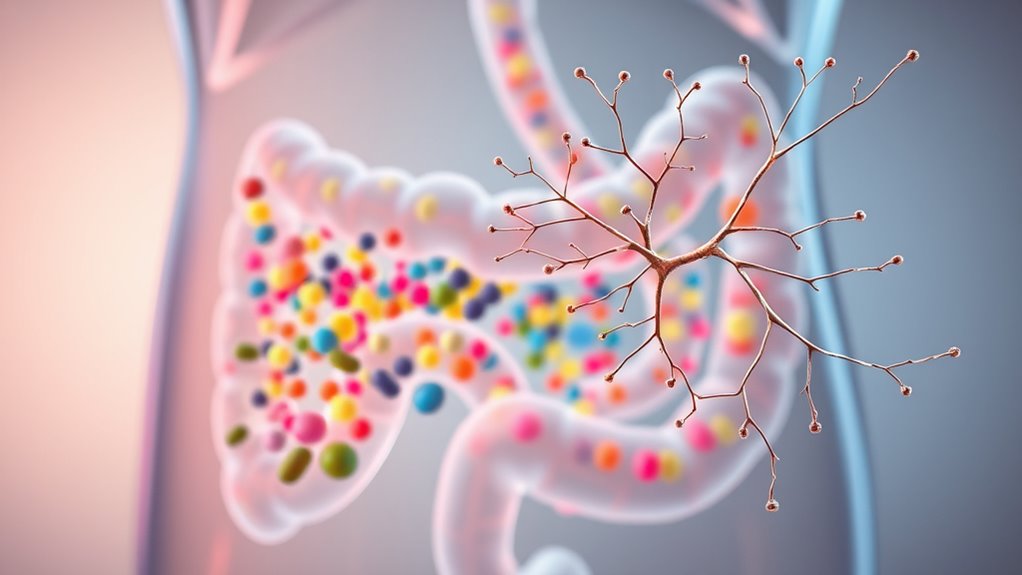Your mood and mental health are closely connected to your gut microbes through the gut-brain axis. These microbes produce neurotransmitters and chemicals that communicate with your brain, influencing emotions, anxiety, and resilience. A diverse and balanced microbiome supports better mental clarity and stability. Factors like diet, stress, and antibiotics can disrupt this balance. Keep exploring to discover effective ways to nurture your gut health for improved mental well-being.
Key Takeaways
- The gut-brain axis connects digestive health with mood regulation through neural, hormonal, and immune signaling pathways.
- Microbes in the gut produce neurotransmitters like serotonin and GABA that influence mental states.
- Higher microbial diversity in the gut supports emotional resilience and reduces anxiety and depression.
- Disruption of gut microbiota via poor diet or antibiotics can negatively impact mood and cognitive function.
- Supporting gut health with fermented foods and probiotics can enhance mood and overall mental well-being.
Understanding the Gut-Brain Connection

The gut-brain connection is a complex communication system that links your digestive system and your nervous system. You might not realize it, but what you eat directly influences this connection. For example, probiotic supplementation helps balance your gut microbiome, which plays a key role in mood regulation. Consuming fiber-rich diets supports the growth of beneficial bacteria, fostering a healthy microbiome. These microbes produce neurotransmitters and other chemicals that communicate with your brain, affecting your emotional well-being. When your gut health improves, you’re more likely to experience better mood and reduced anxiety. Understanding this connection highlights the importance of nourishing your gut through smart dietary choices and probiotic support, setting the foundation for a healthier mind and body. Developing a positive gut-brain axis mindset can further enhance overall emotional resilience and well-being.
The Microbiome’s Role in Mental Health

Your microbiome’s diversity can influence your mood and mental clarity. Gut-brain signaling pathways transmit messages that affect how you feel and think. Exploring microbiome impact strategies can help you support better mental health through your gut. Advances in biotechnology are also enabling new methods to analyze and modulate the microbiome for improved wellness.
Microbial Diversity and Mood
A diverse and balanced microbiome plays a crucial role in regulating mood and mental health. When your gut hosts a variety of beneficial microbes, it supports overall resilience and helps manage stress. Higher probiotic diversity promotes microbial resilience, making your microbiome better at adapting to changes and resisting harmful influences. This diversity influences the production of mood-regulating chemicals like serotonin and GABA.
- Greater probiotic diversity enhances mood stability.
- Resilient microbes help prevent dysbiosis linked to anxiety and depression.
- A rich microbiome supports immune function, reducing inflammation affecting mental health.
- Maintaining microbial diversity can improve long-term mental well-being through sustained gut-brain communication.
Gut-Brain Signaling Pathways
Gut-brain signaling pathways form the communication network that links your microbiome to mental health. Through these pathways, your gut microbes influence your mood and cognition. The vagus nerve acts as a direct highway, transmitting signals between your gut and brain. Microbial metabolites, like neurotransmitter precursors, also shape your mental state by crossing into your bloodstream and affecting brain function. These pathways create a dynamic feedback loop, where your microbiome not only responds to your emotions but also influences them. Recognizing this connection can empower you to nurture your gut health for better mental well-being. Here’s a glimpse into how these pathways impact you:
| Pathway | Impact |
|---|---|
| Vagus nerve | Sends mood-related signals |
| Microbial metabolites | Modulate neurotransmitter levels |
| Immune system | Influences inflammation and mood |
| Hormonal signals | Regulate stress responses |
| Gut-brain dialogue | Shapes your overall mental health |
Microbiome Impact Strategies
Improving your microbiome can considerably enhance your mental health, as evidence shows that targeted strategies can modulate gut bacteria to support mood and cognitive function. To influence your microbiome, consider these approaches:
- Incorporate probiotic supplementation to introduce beneficial bacteria directly.
- Consume fermented foods like yogurt, kefir, sauerkraut, and kimchi regularly.
- Reduce processed foods and sugars that disrupt gut balance.
- Maintain a diverse diet rich in fiber, fruits, and vegetables to nourish beneficial microbes.
These strategies work together to promote a healthier microbiome, which can positively impact your mood and mental clarity. By actively supporting your gut bacteria, you optimize the gut-brain connection and foster overall mental well-being.
How Gut Bacteria Influence Mood and Behavior

Your gut bacteria can produce neurotransmitters like serotonin and GABA, which directly affect your mood and emotions. When gut inflammation occurs, it can disrupt these chemicals and lead to feelings of anxiety or depression. Understanding this connection helps explain how your gut health influences your overall mental well-being. Additionally, maintaining a healthy microbiome with beneficial bacteria can support better mood regulation and emotional resilience.
Microbial Production of Neurotransmitters
Research shows that certain gut bacteria can produce neurotransmitters, which are chemical messengers that influence mood and behavior. These microbes synthesize substances like serotonin, GABA, dopamine, and norepinephrine, directly impacting your mental health. By consuming probiotic supplementation and dietary fiber, you can support the growth of these beneficial bacteria. Fiber acts as fuel for these microbes, boosting their ability to produce mood-regulating chemicals. This microbial production can help improve your emotional well-being and reduce stress. Here are key points to contemplate:
- Gut bacteria synthesize neurotransmitters affecting mood
- Probiotic supplements support beneficial microbial populations
- Dietary fiber enhances microbial production of neurotransmitters
- Mood improvements may result from increased microbial activity
Focusing on diet and probiotics may help optimize your gut-brain communication.
Gut Inflammation and Mood
How does gut inflammation influence mood and behavior? When your gut becomes inflamed, it can trigger the release of cytokines and other inflammatory molecules that affect your brain, leading to feelings of anxiety or depression. This inflammation may also disrupt your gut flora, impairing fermentation benefits that support mental health. A healthy gut flora helps produce essential nutrients and neurotransmitters, but inflammation can weaken this balance, reducing the production of mood-stabilizing compounds. Additionally, inflammation can increase gut permeability, allowing harmful substances to enter your bloodstream and further impact your brain. Maintaining a balanced gut flora through proper nutrition and fermented foods can help reduce inflammation, supporting a healthier gut-brain connection and improving your overall mood and behavior.
The Science Behind the Gut-Brain Axis

The gut-brain axis is a complex communication network that links your gastrointestinal system with your central nervous system. It involves multiple pathways, including neural, hormonal, and immune signals, which influence your mood and mental health. Fermentation benefits are key here, as they enhance the production of beneficial compounds like short-chain fatty acids that support brain function. Probiotic strains play a crucial role by restoring microbiome balance, producing neurotransmitters like serotonin, and reducing inflammation. These actions help regulate stress responses and improve mood. Understanding the science behind this axis reveals how your gut health directly impacts your mental well-being. Here’s a quick overview: 1. Neural pathways transmit signals between gut and brain. 2. Fermentation benefits boost beneficial metabolites. 3. Probiotic strains promote microbiome balance. 4. Neurotransmitter production influences mood. Color accuracy impacts the overall quality of the visual experience, making it a vital factor in optimizing your gut-brain connection.
Factors That Affect Gut Microbiome Balance
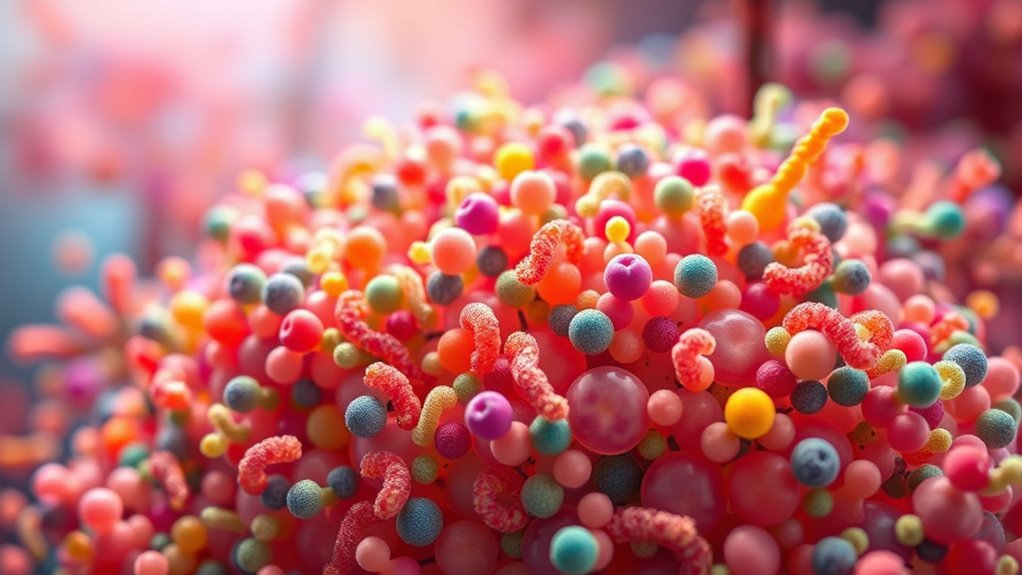
Several factors can disrupt your gut microbiome balance, influencing overall health and mood. Poor diet, stress, antibiotics, and lack of physical activity can diminish beneficial bacteria. Consuming probiotic foods like yogurt, kefir, and sauerkraut introduces helpful microbes that support balance. Dietary fibers, found in fruits, vegetables, and whole grains, serve as fuel for these good bacteria, promoting diversity and resilience. Conversely, processed foods high in sugar and unhealthy fats can harm your microbiome. Antibiotics, while necessary at times, may wipe out both harmful and beneficial bacteria, so use them cautiously. Maintaining a healthy lifestyle with a nutrient-rich diet, probiotics, and fiber intake helps keep your gut microbiome balanced, which, in turn, supports your mood and mental well-being. Additionally, choosing vetted supplements and products can further enhance microbiome health.
Signs of an Imbalanced Microbiome
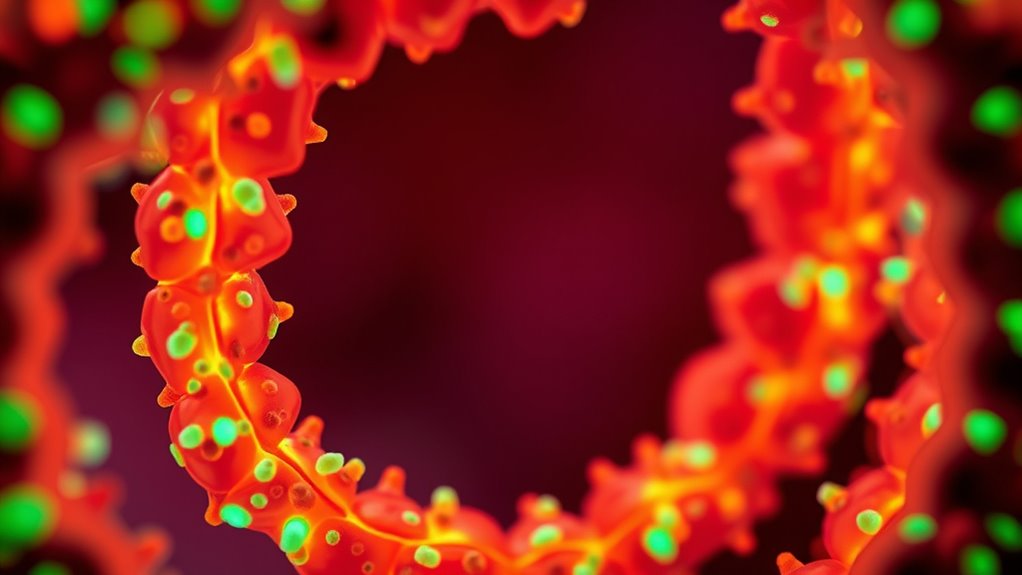
Have you noticed frequent digestive issues, like bloating, gas, or irregular bowel movements? These could be signs of an imbalanced microbiome. An imbalance affects fermentation benefits, leading to less production of essential nutrients and more harmful bacteria. You might also encounter fatigue, mood swings, or trouble concentrating, which are linked to gut health. Beware of probiotic myths—simply taking supplements won’t fix everything without a balanced diet. Here are common signs:
- Persistent bloating or gas
- Irregular bowel habits
- Unexplained fatigue
- Mood disturbances or anxiety
Recognizing these signs helps you understand your gut’s state. An imbalanced microbiome impacts both digestion and mental health, signaling it’s time to reassess your gut health. For instance, a diverse microbiome is crucial for maintaining overall health and preventing imbalances.
Strategies to Support Gut and Mental Well-Being
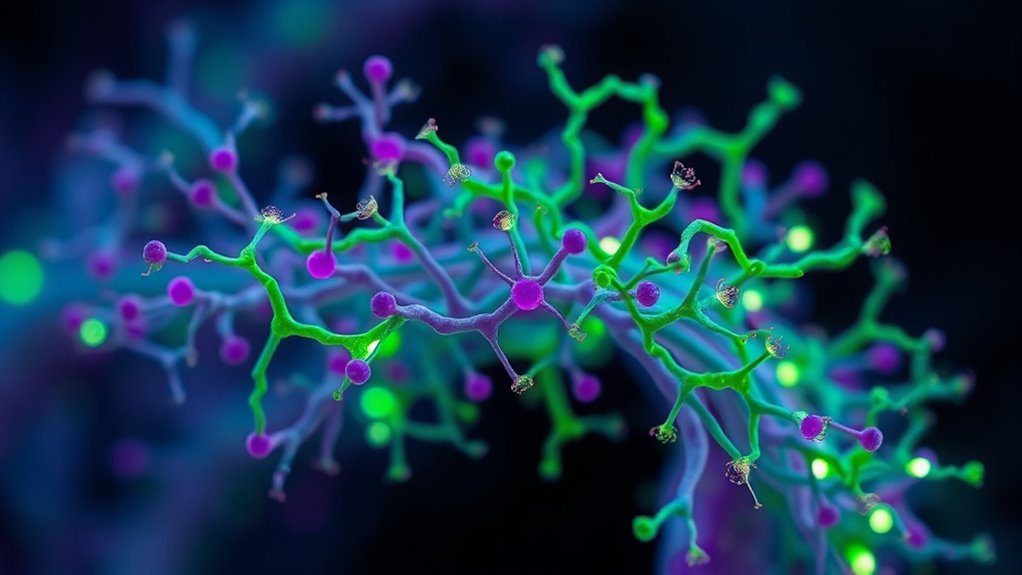
Supporting your gut and mental well-being involves adopting practical strategies that promote a balanced microbiome. Incorporate fermented foods like yogurt, kefir, sauerkraut, and kimchi into your diet to boost beneficial bacteria naturally. These foods provide live microbes that help maintain microbial diversity, supporting mood and cognitive health. Additionally, consider taking probiotics supplements to reinforce your gut flora, especially if you’ve recently taken antibiotics or experienced digestive issues. Choose high-quality probiotics with diverse strains for better results. Pairing these dietary strategies with regular exercise, stress management, and adequate sleep can further enhance your microbiome’s health. Creating the perfect farmhouse bedroom ambience can also promote relaxation and mental well-being. By actively supporting your gut through fermented foods and probiotics, you create a stronger foundation for improved mood and overall mental well-being.
The Future of Microbiome-Targeted Therapies
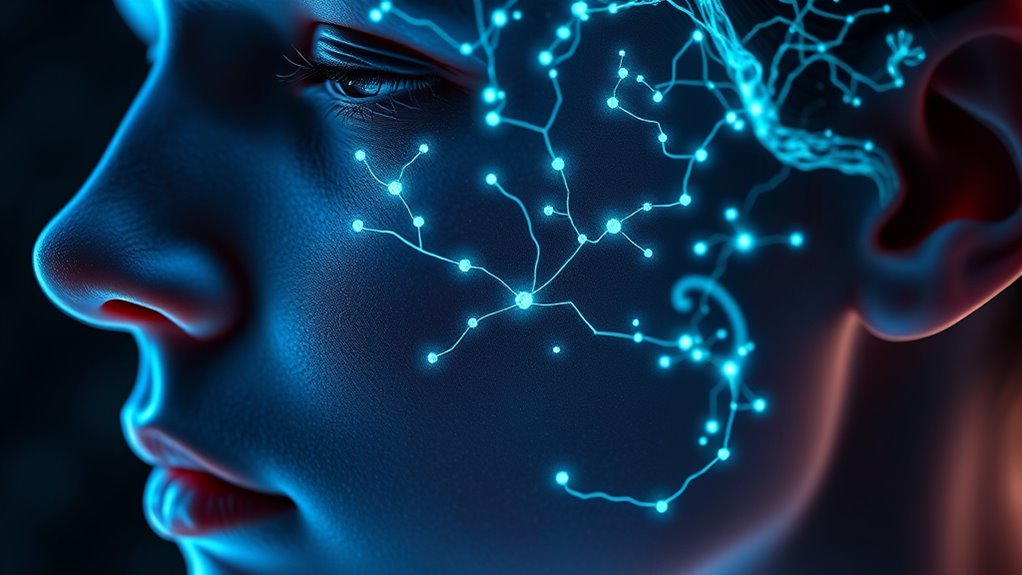
As research into the gut-brain axis advances, microbiome-targeted therapies are poised to revolutionize mental health treatment. You might soon see personalized probiotic therapies designed to balance your gut bacteria and improve mood. Fecal microbiota transplants could become a standard option for resetting gut health, with potential mental health benefits. These therapies rely on modifying the microbiome to influence brain function directly. Here are some key developments to watch:
- Development of targeted probiotic strains for mood regulation
- Advances in fecal microbiota transplantation for mental health conditions
- Use of microbiome profiling to personalize treatments
- Integration of microbiome therapies with existing mental health approaches
– Incorporating comfort solutions for sofa beds and other supportive strategies may enhance overall well-being during treatment or recovery periods.
These innovations promise more effective, tailored options for mental well-being rooted in your microbiome.
Practical Tips for Nurturing Your Gut Health

Taking simple, consistent steps to nurture your gut health can have a significant impact on your overall well-being. Incorporate fermented foods like yogurt, kefir, sauerkraut, or kimchi into your daily diet to introduce beneficial probiotics that support your microbiome. These foods help balance gut bacteria, which can influence your mood and stress levels. Additionally, managing stress is vital; chronic stress disrupts gut harmony and weakens your immune system. Practice stress management techniques such as deep breathing, meditation, or regular exercise to keep your gut functioning at its best. Staying hydrated, eating a fiber-rich diet, and avoiding unnecessary antibiotics also contribute to a healthy gut. Incorporating air purifiers can further improve indoor air quality, supporting your respiratory health and overall well-being. Small, consistent changes like these can boost your gut health and positively impact your mental and emotional well-being.
Frequently Asked Questions
Can Gut Health Influence Neurological Diseases Beyond Mood Disorders?
You might not realize it, but your gut health can influence neurological diseases beyond mood disorders. Poor gut health can lead to gut inflammation, which may contribute to neurodegenerative diseases like Alzheimer’s or Parkinson’s. When your gut is imbalanced, harmful bacteria can produce toxins that affect your nervous system. Maintaining a healthy gut through diet and probiotics can help reduce inflammation and support brain health, potentially lowering the risk of these serious diseases.
How Does Diet Impact the Diversity of the Gut Microbiome?
Diet diversity plays a vital role in shaping your microbiome richness. When you include a wide variety of foods, especially fiber-rich fruits, vegetables, and whole grains, you promote a more diverse microbiome. This diversity enhances the resilience and functionality of your gut bacteria, supporting overall health. By making mindful choices to diversify your diet, you help maintain a balanced microbiome, which can positively influence your mood, immune system, and digestion.
Are There Specific Probiotics Proven to Enhance Mental Health?
Your mental health can feel like an unstoppable force, and specific probiotics might help boost it even more. Certain probiotic strains, like Lactobacillus and Bifidobacterium, have shown promising results in supporting mental well-being. While research is ongoing, these strains could positively influence your mood, reduce anxiety, and improve overall mental health. Incorporating probiotics with proven strains may be a simple yet powerful step toward better mental resilience.
What Role Do Antibiotics Play in Altering the Gut-Brain Axis?
Antibiotics can markedly disrupt your microbiome, leading to microbiome disruption and potential mood changes. They kill beneficial bacteria, which may weaken the gut-brain axis connection. Overuse of antibiotics also raises concerns about antibiotic resistance, making future infections harder to treat. To protect your mental health and gut health, use antibiotics only when necessary and follow your healthcare provider’s guidance carefully.
How Quickly Can Lifestyle Changes Improve Gut and Mental Health?
Imagine experiencing rapid benefits from simple lifestyle adjustments—you might notice mood shifts in just days. Small changes like improving your diet, managing stress, and getting enough sleep can quickly boost your gut health, which in turn enhances your mental well-being. These lifestyle adjustments work swiftly, showing that your habits directly influence your microbiome and mood far sooner than you might expect. Don’t wait; start today for noticeable results tomorrow.
Conclusion
So, next time you’re feeling cranky or anxious, maybe it’s not just your boss or your bad luck—perhaps your microbiome is throwing a tantrum. Remember, your gut’s got more influence over your mood than your favorite playlist. So, treat your bacteria well; after all, they’re the tiny, invisible puppeteers pulling your emotional strings. Keep them happy, and you might just find yourself smiling without even trying—who knew happiness was a gut feeling?
